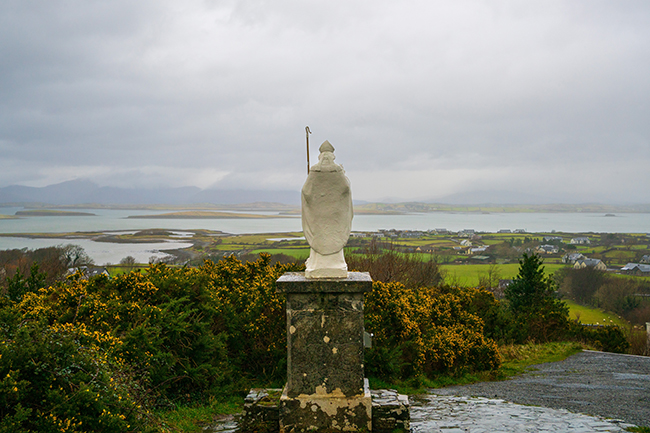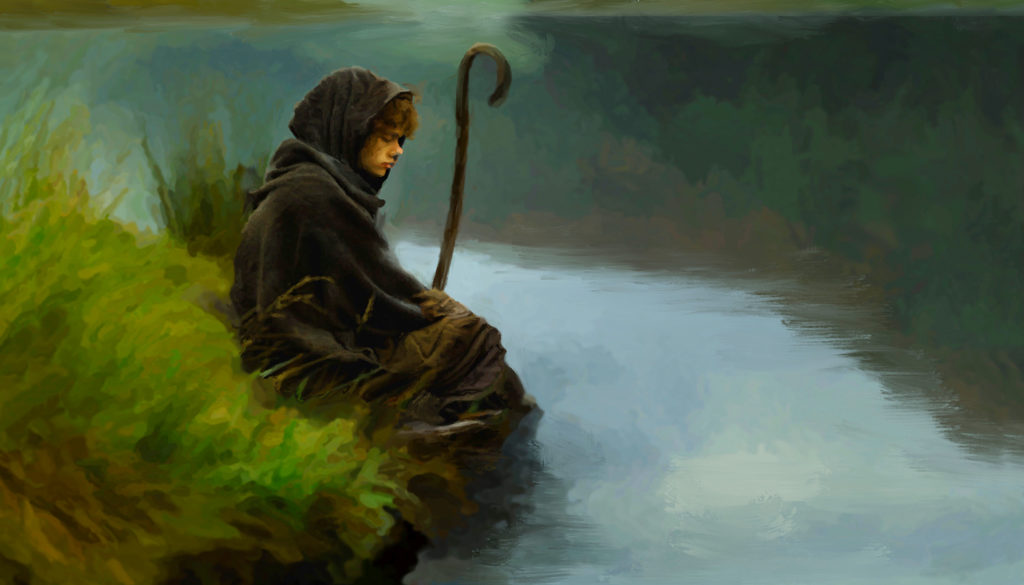Adolescence is hard. The body puts a kid through years of daily shapeshifting. The mind throws everything into question. And the emotions, like the universe itself, seem to expand at high speed in all directions simultaneously.
Imagine going through all that at what seems to be the end of the world?
I’m not talking about kids today.
I’m talking about another time the world came to an end, and I’m talking about a teen named Patrick. We would later come to know him as St. Patrick. But as a teen he was no saint.
He’d had promising beginnings. He was a cradle Catholic, born into a family inclined to the service of the Church. His father was a deacon, and his grandfather had been a priest. (The practice of celibacy was irregular in Britain back then. Everything was irregular.)
His family was well off, and they could afford to give him what passed for an education in those days.
The problem, though, was with those days. The world seemed to be collapsing quickly. For 3 1/2 centuries, the island of Britain had rested securely in the Roman Empire. It was the frontier, and its borders and coastal lands were guarded by military personnel. They kept the barbarians out. They kept the pirates away.
But then Italy was breached, and later Rome, and the emperors moved their divisions away from the edges of the empire to guard its center.
The edges collapsed. Piracy returned to the seas. The towns and cities were destabilized. And ordinary people began a slide into moral carelessness and then moral lawlessness.
Patrick's life suffered the same degradation. The child of Christian clergy would confess in his late-life memoir: “I did not know the true God.”
At some point during his youth, Patrick committed a grave sin. He revealed it to a friend, who later went on to blab it to the world. We don’t know what his sin was. He doesn’t bother to name the sin in his memoir, because he assumes all of his readers are already aware, thanks to h
is friend’s gossip. All we know of the sin is that it was the matter of a day — and not even that. It was the matter of an hour.
But it was a sign of how far Patrick had strayed from God. And he kept straying. “In fact,” he said, “I remained in death and unbelief until I was reproved strongly.”
Reproof came when the world in its dissolution consumed Patrick in his.
Pirates, now roaming freely along the coastline, conducted raids by night on the towns near the shore. One night they came to Patrick’s town, Bannavem Taburniae, and they did what pirates do. Patrick suffered the havoc of violence, fire, the rage of men, and the screams of women. All the valuable possessions of the town were taken to the ship — and among them was Patrick.
Somewhere between a boy and a man, he would surely fetch a high price as a slave.
Patrick saw immediately that he was now just another of the many who had disappeared from the coastal region. “I was taken into captivity in Ireland, along with thousands of others. We deserved this, because we had gone away from God, and did not keep his commandments. We would not listen to our priests, who advised us about how we could be saved.”
Hours before his capture, he had been a teen full of bluster. Immediately, however, “among foreigners ... it was seen how little I was.”
In Ireland, Patrick the slave was made to tend herds of sheep. It was hard, dirty, and lonely work — outdoors in all elements: rain, snow, and high heat. He was “brought low by hunger and nakedness daily.”
He wallowed in misery awhile, but Patrick eventually remembered the lessons his parents and schoolteachers had taught him. “My sins [had] prevented me from really taking in what I read,” he explained. But now repentance opened his mind.
From his earliest years he recalled his lessons on prayer, and he put them to use. Gradually he built up the frequency and duration of his devotions: “I prayed often during the day. More and more the love of God increased. ... In one day I would pray up to a hundred times, and at night perhaps the same.”
While exiled in a pagan land — and without Christian books or guides — Patrick became adept at the interior life. He learned to listen for God. He learned to wait. He learned to persevere.
He implored God to help him find his way home, and after some indeterminate time he discovered the way to freedom. A voice told him one night: “You have fasted well. Very soon you will return to your native country.”
And then later: “Look! Your ship is ready!”
That was good news indeed, except that Patrick was 200 miles from the nearest port.
He didn’t care. He started walking.

That began another series of journeys for Patrick, but eventually he did find his way home. And then, in troubling dreams, he received the call to return to Ireland — the land that had enslaved him — and evangelize the people there. His family and friends begged him not to leave them again, and he would have preferred to stay home. But he had learned to trust the promptings of God.
By his own reckoning, Patrick went on to baptize thousands of people in Ireland, including many from the families of kings. The great warriors were alarmed when their sons and daughters eagerly responded to celibate vocations.
Patrick responded with prayerful diplomacy, and by the end of his life he had conquered the island for Christ.
No one had seen that coming — not his parents, not his teachers, not the local clergy in his British hometown.
At home, Patrick was a typical lapsed-Catholic teen, disaffected from religion, bored by prayer, and sinning without compunction. His world, the Roman world, was falling apart; and perhaps he assumed the Christian religion was crumbling with it. Whatever.
Yet his parents had given him what they could. They had given God something to work with.
And God worked what he could.
Patrick won Ireland for Christ, and it was Ireland that won the West back from its decline.
Those children of the warrior-kings? They brought new life to Western monasticism.
The Irish monks went abroad to re-evangelize the dispirited continent of Europe. They were there at the establishment of schools and universities. Later in history, Irish clergy, sisters, and laypeople would immigrate to the United States and astonish the continent with their system of schools, hospitals, orphanages, and vast network of other charities.
As the author Thomas Cahill put it in his book: because of Patrick, the Irish “saved civilization.”
Yet, in some ways, Patrick never made up for his teenage laziness. He never got good at Latin, and his grammar was so bad that he apologized repeatedly for it and confessed himself embarrassed by his own writing.
But it didn’t matter. God overachieved through Patrick the self-professed sinner.
Which of today’s disaffected teens will God summon to become Patrick for tomorrow’s world?

